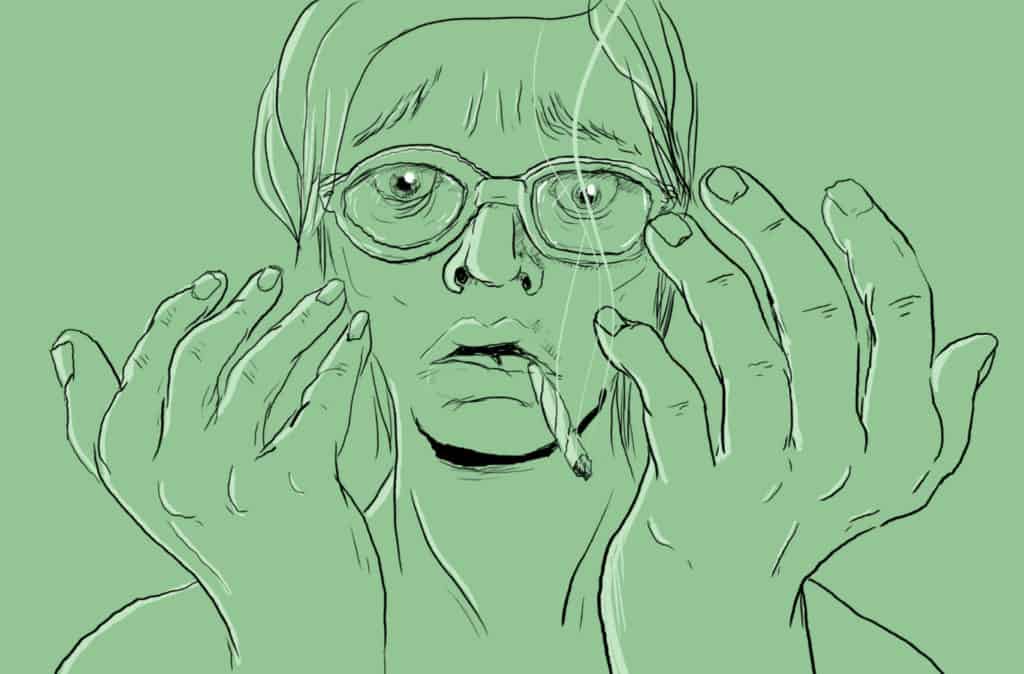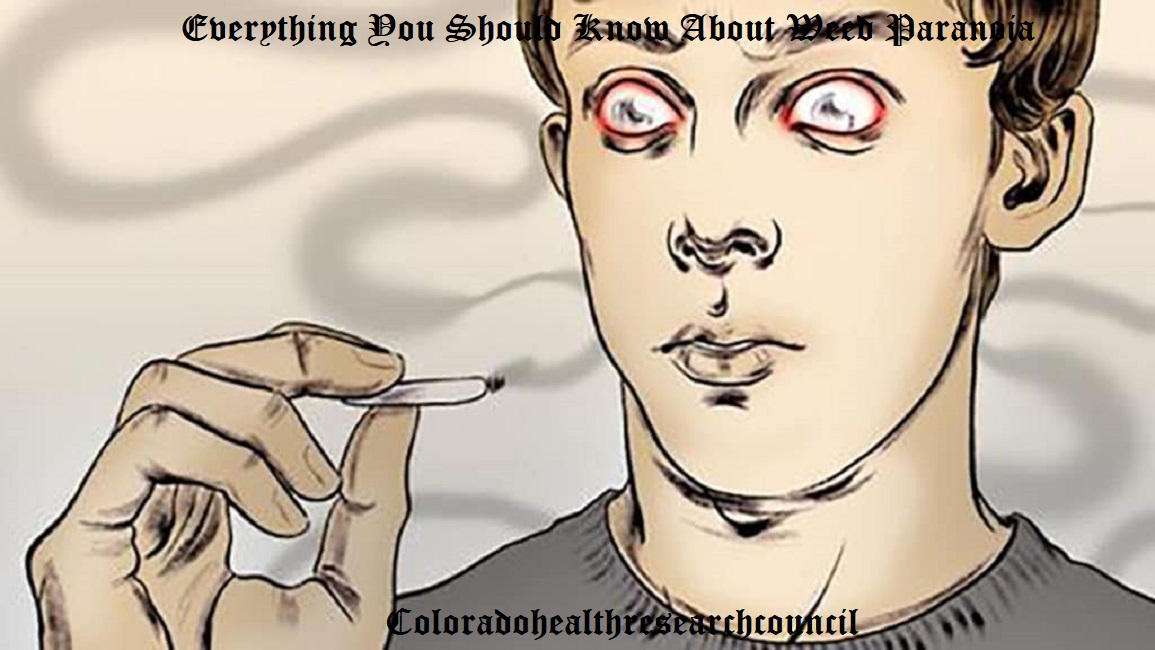Most people can recall a time they got way too high and experienced a bit of a paranoid episode. Sometimes it manifests as mild worrying, and other times you find yourself in the fetal position at the top of a Doritos pile dialing 911 because surely this high will be the death of you (true story, guys). Paradoxically, others use cannabis as a tried-and-true way to annihilate their anxiety. Even PTSD patients are using medical marijuana to treat stress and panic symptoms with remarkable rates of success.
Paranoia has always been the Achilles heel of nature’s most wondrous plant. As with all things in life, a dark side exists in the ying-yang of cannabis use. While a medicinal cure-all to many, some weed exists as a portal to one’s personal hell, complete with spells of anxiety, doubts of self-worth and the psychological implications that follow.
The web woven from the many intersections of marijuana and paranoia is built on a strange bed of scientific facts and first-hand accounts, peppered by the lies lingering from Reefer Madness-era propaganda and its accompanying pseudoscience.
There are scientific theories as to why weed causes paranoia, and then there are a plethora of cultural stigmas surrounding the plant itself. The public perception exists somewhere between the two.
In an attempt to dissipate the metaphorical smoke surrounding this topic’s many mirrors, here is a brief explainer of weed paranoia, addressing each of the scientific and cultural facets of this strange, hazy paradox.
Pre-Existing Anxiety Affects Your Cannabis Experience
A 2009 review of anxiety and cannabis studies concluded that “frequent cannabis users appear to have higher levels of anxiety than non-users,” and that “a considerable number of subjects developed anxiety disorders before the first symptoms of cannabis dependence.” That led researchers to believe that anxiety-prone people tend to use cannabis as a self-prescribed anxiety medicine, opposing the idea that cannabis is what’s causing the anxiety.
While these cannabis use trends are helpful in understanding broad behavioral tendencies, researchers acknowledge that anxiety is highly individualized based on a number of risk factors:
- Genetic vulnerability
- Personality
- Gender
- History of paranoid episodes
- Presence of anxiety disorder
- Basal anxiety levels
- Abstinence states
And when you throw cannabis into the mix, a few other risk factors emerge:
- Frequency of use
- Dose
- Cannabinoids
- Set and setting
While anxiety is no doubt unique and nuanced in every individual, researchers noted that regular users tend to see a decrease in anxiety whereas occasional and new users were more likely to experience heightened paranoia. Anxiety was also more likely to occur in high doses of THC.
It’s impossible to say how cannabis will affect you personally unless you’ve already tried it for yourself, but understanding what biological and environmental factors are at play can certainly help guide you to a better experience.

What is cannabis?
Cannabis is an illegal drug made from the cannabis plant. You can smoke or eat cannabis. You can smoke it on its own or mix it with tobacco to make a ‘joint’ or ‘spliff’. It can also be cooked in food or brewed in tea.
People use cannabis for different reasons. Sometimes they use it to relieve mental or physical symptoms. This is called self-medication. This may make you feel better in the short term. But in the longer term it can increase problems or create new ones.
Cannabis is the most widely used illegal drug in Britain. Young people are more likely to use it than older people.
Cannabis can be called marijuana, dope, draw, ganja, grass, hash, herb, pot, and weed, and other things.
Stronger types of cannabis can be called skunk, super-skunk, Northern Lights, Early Girl and Jack Herer.
You can find more information about cannabis, on the FRANK website. You can find the details of the website in the Useful Contacts section of this page. The website tells you what cannabis looks like, how it is used and the law on cannabis.
How does cannabis work?
Cannabis will go into your bloodstream when smoked. It will quickly be carried to your brain and stick to your receptors. This will affect your mood and behaviour.
Cannabis contains lots of different chemicals known as cannabinoids. Some examples are cannabidiol (CBD) and tetrahydrocannabinol (THC). THC is the main active ingredient in the cannabis plant. The more THC there is in cannabis, the greater the effect will be.
Skunk is a stronger variety of cannabis. It contains higher levels of THC. Evidence suggests that the effects of skunk are faster and stronger than milder cannabis.
CBD can lessen the unwanted psychoactive effects of THC such as hallucinations and paranoia. It can also reduce anxiety. This means that the effects of THC will be lower if there is more CBD in the plant.
How can cannabis make me feel?
The effects of cannabis can be pleasant or unpleasant. Most symptoms will usually last for a few hours. But there can be unpleasant long term symptoms. Especially if you used cannabis regularly over a long period of time. The risks can also be worse if are young and smoke strong cannabis, like skunk.
What are the pleasant effects of cannabis?
Cannabis can make you feel happy, relaxed, talkative or laugh more than usual.You may find that colours and music are brighter and sharper. Pleasant effects are known as a ‘high.’
What are the unpleasant effects of cannabis?
Cannabis can cause hallucinations, changes in mood, amnesia, depersonalisation, paranoia, delusion and disorientation. You might find it harder to concentrate or remember things. You may find that you can’t sleep well and you feel depressed. You may also feel hungry or like time is slowing down.
You might have lower motivation. And cannabis can affect how you sense things. You may see, hear or feel things differently. This is known as hallucinating. Hallucinations can be a sign of psychosis.
Psychosis can be a symptom of mental illness, including schizophrenia, schizoaffective disorder and bipolar disorder. These can be called ‘psychotic illnesses.’
You can use the links below to find out more about:
- Psychosis
- Schizophrenia
- Schizoaffective disorder
- Bipolar disorder
Or call our General Enquries team on 0121 522 7007 and ask them to send you a copy of our factsheet.
Can cannabis affect my mental health?

Regular cannabis use is linked to an increased risk of anxiety and depression. But most research seems to have a focus on the link between psychosis and cannabis.
Using cannabis can increase the risk of later developing psychotic illness, including schizophrenia. There is a lot of reliable evidence to show a link between the use of stronger cannabis and psychotic illnesses, including schizophrenia. But the link is not fully understood.
Cannabis may be one of the causes of developing a mental illness, but it isn’t be the only cause for many people. Not everyone who uses cannabis will develop psychosis or schizophrenia. And not everyone who has psychosis or schizophrenia has used cannabis. But you are more likely to develop a psychotic illness if you smoke cannabis. And are ‘genetically vulnerable’ to mental health problems.
‘Genetically vulnerable’ means that you are naturally more likely to develop a mental health problem. For example, if people in your family have a mental illness, you may be more likely to develop a mental health problem. if someone in your family has depression or schizophrenia, you are at higher risk of getting these illness when you use cannabis.
Cannabis can have the following effects.
- Long term use can have a small but permanent effect on how well you think and concentrate.
- Smoking cannabis can cause a serious relapse if you have a psychotic illness.
- Regular cannabis use can lead to an increased risk of later developing mental illness. Especially if you use cannabis when you are young.
For more information, see our ‘Does mental illness run in families’ section Or call our General Enquiries team on 0121 522 7007 and ask them to send you a copy of our factsheet.
